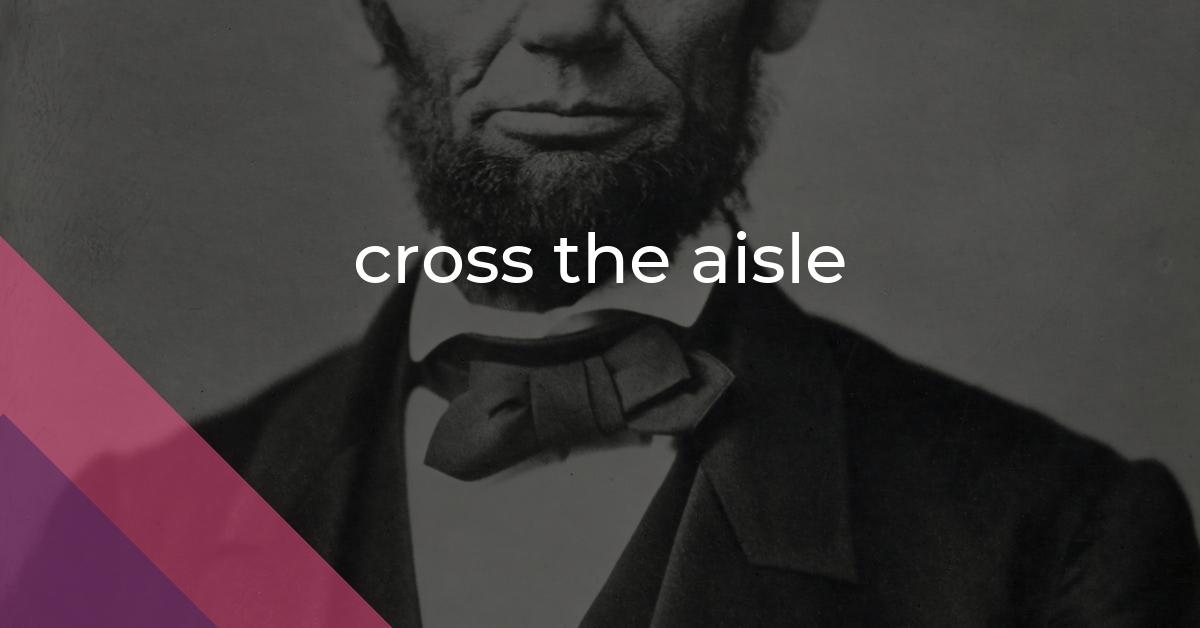cross the aisle: Idiom Meaning and Origin
What does ‘cross the aisle’ mean?
The idiom "cross the aisle" refers to the act of politicians from different political parties working together or collaborating, often in a bipartisan manner, to find common ground and resolve issues or pass legislation.

Idiom Explorer
The idiom "join forces" means to unite or collaborate with someone or a group of people to achieve a common goal or objective.
The idiom "go their separate ways" means to separate or part ways, typically after a period of being together or working together.
The idiom "go along to get along" means to conform or agree with others in order to avoid conflict or maintain harmony, often sacrificing personal opinions or beliefs.
The idiom "give and take" means to compromise or negotiate with others, by both parties making concessions and understanding each other's needs.
The idiom "get along" means to have a harmonious relationship or to manage without problems. It refers to the ability to coexist or work well together.
The idiom "fall between two stools" means to fail or be unsuccessful because of indecision or inaction.
The idiom "drift apart" means to gradually become less close or connected to someone, often due to a lack of shared interests or time spent together.
The idiom "down the road, not across the street" is a metaphorical expression suggesting that one should face their problems head-on rather than seeking an easy way out. It implies that a more direct approach will lead to better solutions or outcomes in the long run.
The idiom "cross to take up" means to switch from one side or position to another, often involving a change in opinion or loyalty.
Unity Pathway
The idiom "cross paths" is related to the phrase "cross the aisle" in that both involve the idea of two things or people encountering each other. While "cross the aisle" is often used in a political context to describe reaching out to members of the opposing party, "cross paths" is more generally used to describe the act of encountering someone or something by chance or unexpectedly.
Imagine walking through a crowded city street and unexpectedly running into a friend you haven't seen in years. In that moment, your paths have crossed. Similarly, in a political context, when politicians from different parties come together to collaborate on a piece of legislation or work towards a common goal, their paths have crossed in the pursuit of a shared objective.
Just as "cross the aisle" emphasizes the importance of setting aside differences and working towards common goals, the idiom "cross-purpose" also highlights the significance of finding common ground. In this case, "cross-purpose" refers to individuals or groups working towards conflicting or opposing goals, often unintentionally.
When politicians are working "cross-purpose," it means that their actions or positions are at odds with one another, complicating the process of achieving shared objectives. In contrast, when politicians are able to "cross the aisle," they are more likely to work in concert and overcome differences to achieve common goals.
Finally, the idiom "cross someone's path" is another related phrase to "cross the aisle." This idiom is used to describe the act of encountering or coming into contact with someone, typically by chance or unexpectedly. Just as individuals may unexpectedly cross paths in their daily lives, politicians may also cross each other's paths in the course of their work.
Whether it is the result of deliberate outreach or a chance encounter, when politicians "cross someone's path," it provides an opportunity for dialogue, collaboration, and the potential for finding common ground. By actively seeking out opportunities to "cross someone's path," politicians can foster relationships, build trust, and work towards shared objectives.
The idiom "cross the aisle" is commonly used in the political sphere to describe the act of reaching out to members of the opposing party. The ability to "cross the aisle" is seen as a valuable skill for politicians, as it allows them to work towards common goals, find areas of agreement, and overcome the challenges of political polarization and gridlock. The related idioms "cross paths," "cross-purpose," and "cross someone's path" highlight the importance of encountering others, finding common ground, and working together towards shared objectives in various contexts. Whether it is in politics, business, personal relationships, or community organizations, the ability to "cross the aisle" and engage in productive collaboration is a crucial skill for effective leadership and problem-solving in today's complex world.
Example usage
Examples of how the idiom cross the aisle can be used in a sentence:
- During the debate, the politician made an effort to cross the aisle and work with members from the opposing party.
- The committee was able to reach a bipartisan agreement by crossing the aisle and considering input from both sides.
- In order to pass the legislation, the senator had to cross the aisle and gain support from members of the other party.
More "Politics" idioms



